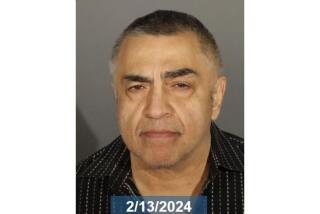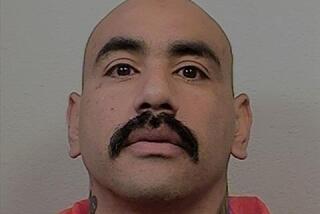Attention Turned to Japanese Gangsters in Camarillo Killing
CAMARILLO — Along with investigating whether the slaying of a Japanese businessman from Camarillo was a hate crime, detectives are exploring whether he may have been killed by Japanese gangsters because of business dealings, authorities said Wednesday.
While pursuing the possibility that Yasuo Kato’s killing was committed by a motorcyclist who threatened his life two weeks earlier, Ventura County Sheriff’s Sgt. Pat Buckley said detectives also are trying to find any connection to the yakuza , as members of Japan’s organized crime syndicates are known.
Buckley’s comment came as other law enforcement officials outside Ventura County observed that the method of Kato’s execution--two clean, swiftly delivered stab wounds to the heart--bore some resemblance to a typical yakuza contract murder, rather than a wanton hate crime.
While saying that the possibility of a gang killing is being explored, Buckley stressed, however, that he has no indication so far of any organized crime tie to Kato.
“We have not narrowed this down in any direction,” Buckley said. “Until we understand why he was killed, then maybe we can find out who did it.”
Other investigators said Wednesday that the investigation is at a preliminary stage, focused on trying to identify anyone with a possible motive. Initial suspicion was directed at an unidentified motorcycle rider who reportedly confronted Kato, 49, with threats and anti-Japanese remarks at his home two weeks before his murder.
“Mainly, we’ve just been interviewing family members at this point, trying to determine if the father had any enemies,” Detective Will Hammer said. “So far we haven’t found any. Sounds like he’s a very likable individual.”
Kato was found in the garage of his Arabian Place home Monday morning by his housekeeper with an eight-inch, blood-stained hunting knife lying nearby. He was apparently killed while unloading groceries from his Toyota vehicle Sunday between 9:30 p.m. and midnight.
In an incident report that Kato filed with sheriff’s deputies four days before he was killed, Kato told deputies that a motorcyclist confronted him at his front door Feb. 9, claiming to be “an unemployed American worker who lost his job because of the Japanese.”
The man, accompanied by a man who stood near the motorcycle, demanded money from Kato and then threatened to kill him after Kato shoved the man out of his house and locked the door, Kato said.
Although that confrontation sparked initial theories that the killing could have been a hate crime, several investigators outside of Ventura County, who were not directly involved in the murder investigation, said details of Kato’s death have led them to question whether the case could be so easily characterized.
The apparent lack of a struggle, the clean wounds reportedly inflicted on the victim and the absence of robbery as a motive raised their curiosity, they said. Indeed, the ambush killing bore some resemblance to a contract murder, raising speculation that financial problems related to Kato’s real estate business, Y&M; Corp. of Oxnard, may have something to do with his death.
Kato started the company after coming to California from Japan in 1988, his 25-year-old son, Toshiyuki Kato, said. The elder Kato received about $4 million in capital from six other Japanese businessmen that he used to purchase several parcels of land in Antelope Valley for residential and commercial projects.
The younger Kato said that the company was “surviving” despite the real estate market’s collapse shortly after his father’s arrival.
One possible murder scenario, investigators outside Ventura County said, is that Japanese organized crime, believed by federal investigators to have encroached in legitimate California real estate investment in recent years, may have attempted to make use of Kato or one of his business partners, and that a business deal had gone awry.
Federal and local law enforcement officials have warned that the yakuza have been spreading their presence across the United States and increasing their activities in real estate, development and legitimate businesses.
Long active in the tourist trade with prostitution and gambling, the gangs have followed the boom of Japanese investment that has swept the West Coast since the late 1980s, investigators believe. Extortion of legitimate businessmen is widely practiced by the yakuza in Japan and investigators say this has spread to Hawaii and possibly to the mainland.
“Any mysterious death of a Japanese businessman of (Kato’s) particular circumstances would certainly warrant at least a cursory look at organized crime connections,” said a law enforcement official specializing in Asian organized crime intelligence, who asked not to be named. “If that angle isn’t investigated, somebody’s not doing their job.”
Christopher Pummer is a special correspondent based in Ventura County and Karl Schoenberger is a Times staff writer in Los Angeles.
More to Read
Sign up for Essential California
The most important California stories and recommendations in your inbox every morning.
You may occasionally receive promotional content from the Los Angeles Times.










